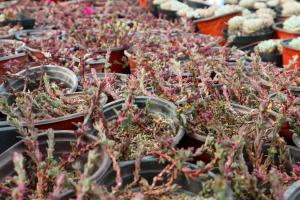Who Planted a Ton of Trees
There are many people in the world that have dedicated their lives to preserving the environment and making it a greener place. One person that stands out in this regard is Wangari Maathai, a Kenyan environmental and political activist who had dedicated her life to sustainable development, democracy, and peace.
The Early Years
Wangari Maathai was born in 1940 in Kenya and grew up in a small rural village called Ihithe. Her parents were farmers, and she learned the value of hard work and dedication from them. Wangari excelled in her studies and was eventually awarded a scholarship to study in the United States.
After completing her studies, Wangari returned to Kenya and became the first woman in East Africa to earn a Ph.D. in veterinary medicine. She then went on to become a professor at the University of Nairobi, where she taught for many years.
The Green Belt Movement
In the 1970s, Wangari became concerned about the rapid deforestation happening in Kenya. She noticed that the forests were being cut down at an alarming rate, which was causing soil erosion, flooding, and a decrease in biodiversity. In response, Wangari founded the Green Belt Movement, an organization aimed at promoting environmental conservation and democracy.
The Green Belt Movement's main objective was to plant trees across Kenya to restore the forests that had been lost. Wangari, along with a team of volunteers, worked tirelessly to plant trees in schools, churches, community centers, and other public areas.
The Impact of the Green Belt Movement
Over the years, the Green Belt Movement has grown significantly, with thousands of volunteers working to plant trees across Kenya. In total, the organization has planted over 50 million trees, helping to restore the country's forests and combat soil erosion and other environmental problems.
But the Green Belt Movement is not just about planting trees. The organization also focuses on empowering women and promoting democracy. Wangari understood that environmental conservation and social justice are closely linked, and that empowering women is essential to achieving both.
The Legacy of Wangari Maathai
Wangari Maathai passed away in 2011, but her legacy lives on. She was the first African woman to receive the Nobel Peace Prize, which she was awarded in 2004 in recognition of her work with the Green Belt Movement.
Wangari showed that one person can make a difference. She dedicated her life to promoting sustainable development and environmental conservation, and through her work, she inspired thousands of people across Kenya and around the world to do the same.
Conclusion
Wangari Maathai was a true environmental icon. Her dedication to preserving the environment and promoting social justice is an inspiration to us all. Through her work with the Green Belt Movement, she planted a ton of trees and showed that one person really can make a difference. We can all learn from Wangari's example and do our part to make the world a greener, more sustainable place.

 how many times do yo...
how many times do yo... how many planted tre...
how many planted tre... how many pine trees ...
how many pine trees ... how many pecan trees...
how many pecan trees... how many plants comp...
how many plants comp... how many plants can ...
how many plants can ... how many plants and ...
how many plants and ... how many pepper plan...
how many pepper plan...































